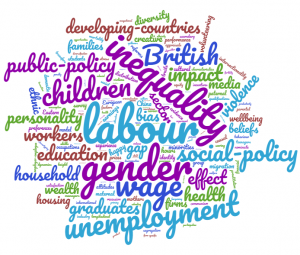Summary
We undertake a variety of applied research using state of the art econometric techniques and a broad set of datasets for the UK, other developed and developing countries. We focus on a number of topical issues as well as drawing on historical events using both micro and macro approaches. Our current focuses are:
- Inequalities. We work on various aspects of labour market inequalities, such as earning gaps across different groups of workers (by gender, ethnicity, disability, social class), and unconscious bias in hiring and promotion. Besides labour market inequalities, we also work on income inequalities and poverty.
- Labour Market Issues across the Career and Lifecycle. We work on issues ranging from child labour to the impact that education and occupational choices, preferences, expectations and beliefs have on labour market outcomes.
- Labour Markets in Developing Countries. We work on various labour market issues related to developing countries, ranging from gendered labour markets (sex work and domestic work) to the impact of labour market reforms on employment.
- Wellbeing. We work on various determinants of wellbeing ranging from vocational education to labour market transitions, intra-household work, and women’s changes in the state pension age. We also work on the impact that wellbeing has on various aspects of people’s life.
- Migration. We work on determinants of migration (with a focus on graduate migration), the impact of immigration on the host country, as well as colonial south-south labour migration from the Indian subcontinent to the former British colonies of the Caribbean. We also work on the impact of migration on the family members left behind.
 People
People
- Academics at Reading:
- Doctoral Researchers:
- Jim Chen
- Richa Saun
Current Projects
- Understanding post emancipation indentured labour migration from the Indian subcontinent to Trinidad (Neha, funded by the British Academy postdoctoral fellowship)
- Comparing creative graduates in the UK and Australia (Sarah, funded by the Australia Research Council)
- Gender and the leadership pipeline: the role of preferences, competitiveness and charitable giving on women’s advancement to leadership in large consulting organisations (Giovanni)
- Relationship between various types of labour market transitions (job to unemployment, job-to-job, and school-to-work) and life satisfaction (Simonetta with colleagues from the Universities of Essex, Sheffield, East Anglia and Swansea, originally funded by the ESRC via the What Works Wellbeing Centre, Work and Learning).
- Impact of the recent increase in women’s pension age on wellbeing of women, especially those born in the 1950s (Simonetta)
- Do Attitudes, Job Preferences and Search Behaviour Explain Differences in Labour Market Outcomes Among University Graduates? Analysis of recent Reading graduates (Simonetta and Sarah)
Events
- Upcoming Events
- Jointly with other departments of the University of Reading we are organising the 3rd International Conference on Gender Research, which will be held at the University of Reading on 2-3 April 2020
Research led teaching
